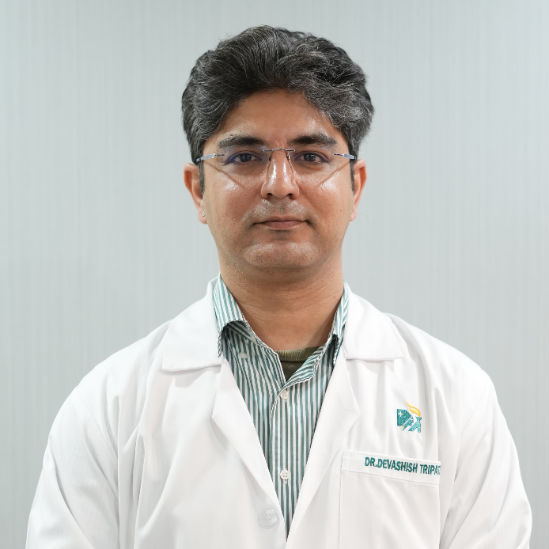Liver Cancer Symptoms & Types
Liver cancer is a serious health concern worldwide. Explore its symptoms, types, risk factors, diagnosis, treatment options, and prevention strategies. Learn how early detection and healthy lifestyle choices can improve outcomes and safeguard liver health.

Written by Dr Sonia Bhatt
Last updated on 3rd Jul, 2025
Understanding Liver Cancer: Symptoms and Types
Liver cancer is a significant and growing global health concern, with the number of cases rising each year. As one of the leading causes of cancer-related deaths worldwide, it poses a serious challenge due to its often late diagnosis and the difficulty of treating advanced stages effectively.
Raising awareness and promoting early detection are crucial steps in improving outcomes for those affected by this deadly disease. This blog evaluates the symptoms and types of liver cancer to support early detection and treatment.
Understanding the Liver’s Function
Bile production for digestion, synthesis of proteins and cholesterol, and the storage of glucose as glycogen are among the crucial roles that take place in the liver. This organ is located in the upper right quadrant of the abdomen.
The liver plays a crucial role in maintaining overall health by detoxifying the body. It cleanses and breaks down toxins, alcohol, and drugs in the bloodstream, ensuring the body's internal environment remains balanced. Additionally, the liver is vital for regulating hormones and supporting the immune system.
Types of Liver Cancer
The following are the main types of liver cancer:
1. Hepatocellular Carcinoma (HCC): It accounts for approximately 75% of all liver cancer cases and originates from hepatocytes, the primary cell type in the liver. Key risk factors include chronic infections with the hepatitis B (HBV) or hepatitis C (HCV) viruses, cirrhosis, and exposure to aflatoxins for many years.
2. Intrahepatic Cholangiocarcinoma: This cancer develops in the bile ducts in the liver and is known as bile duct cancer. It’s rare but aggressive and often diagnosed late. Common symptoms include jaundice, abdominal pain, and unintentional weight loss.
3. Angiosarcoma: A rare and aggressive cancer originating from the blood vessel cells of the liver, angiosarcoma is associated with high mortality rates. Its development can be linked to factors such as prior radiation therapy for other cancers, chronic lymphedema, UV exposure (commonly affecting the head and neck), and occupational or chemical exposures to substances like vinyl chloride, arsenic, or anabolic steroids.
4. Metastatic Liver Cancer: Also known as secondary liver cancer, occurs when cancer cells from another part of the body spread to the liver.
Stages of Liver Cancer
Cancer staging is crucial for determining the appropriate treatment. This process assesses how far the illness has spread and identifies the cancer's stage within the body. It involves various diagnostic tools, including imaging tests, biopsies, and blood analyses.
Liver cancer can be categorised into the following stages:
Stage A (Localised): The cancer is confined to its original site and has not spread beyond the liver.
Stage B (Advantageous Spread): The tumour has grown but is still contained within the liver, often affecting multiple parts of the liver.
Stage C (Regional Spread): The cancer has spread to nearby blood vessels or lymph nodes but remains within the liver region.
Stage D (Advanced/Metastatic): The cancer has spread beyond the liver to distant organs or tissues, significantly affecting prognosis and treatment options.
Staging helps guide treatment decisions; for example, localised cancers may be surgically removed, while advanced stages may require systemic therapies like chemotherapy.
Symptoms of Liver Cancer
Early-stage liver cancer symptoms are often mild and include:
Persistent fatigue
Unexplained weight loss
Loss of appetite
Nausea and vomiting
Progressed liver cancer may present with more severe signs, such as:
Pain or swelling in the abdomen
Jaundice (yellowing of the skin and eyes)
Dark urine and pale stools
Persistent itching
Swelling in the legs
Consult Top Doctors for Your Symptoms
Causes and Risk Factors
Several factors contribute to the development of liver cancer, many of which are preventable:
Viral Infections: Chronic infection with Hepatitis B (HBV) or Hepatitis C (HCV) is a leading cause of liver cancer. These infections can result in prolonged liver inflammation, increasing the risk of cirrhosis and cancer.
Alcohol Consumption: Excessive alcohol intake over time damages liver cells and may cause cirrhosis, a significant risk factor for liver cancer.
Obesity and Nonalcoholic Fatty Liver Disease (NAFLD): Obesity can lead to fatty liver disease, which, if left untreated, may progress to cirrhosis and elevate the risk of liver cancer.
Diagnosis of Liver Cancer
Tests such as ultrasound, CT (Computed Tomography) scans, and MRIs (Magnetic Resonance Imaging) are conducted to detect liver abnormalities. These methods offer high-definition images, facilitating early diagnosis.
A liver biopsy, where a tissue sample is removed and examined under a microscope, is often necessary to confirm the diagnosis and determine the cancer type. This process helps in developing a personalised treatment plan.
Treatment Options for Liver Cancer
There are several treatment options available for liver cancer, depending on the stage and extent of the disease.
Surgery: Surgical resection is removing the cancerous liver, sparing the healthy tissue. It works best for cases that are still in the early stages.
Liver Transplantation: This method involves removing the diseased organ and replacing it with a healthy one, offering a curative option for certain patients with cancer or end-stage liver damage.
Ablation Therapy: Minimally invasive therapies like radiofrequency ablation and cryoablation kill cancer cells. These are often options when surgery is not an option.
Prognosis and Survival Rates
The prognosis of liver cancer varies based on several factors, including when the cancer is diagnosed, the patient’s overall health, and the functioning status of the liver.
This is crucial because early detection improves survival rates, and localised cancers are more likely to be treated successfully.
According to the National Cancer Institute, the 5-year relative survival rate for localised liver cancer is approximately 35%. However, this rate drops significantly to 12% when the cancer has spread to nearby tissues or lymph nodes (regional spread) and to just 3% when the disease has metastasised to distant organs.
Prevention and Lifestyle Changes
Adopting preventive measures and making healthy lifestyle choices can significantly reduce the risk of liver cancer.
Hepatitis B vaccination is a notable preventive intervention. Antiviral therapies for hepatitis C also can reduce cancer risk.
Healthy habits such as drinking less alcohol, having a reasonable diet, and exercising more help protect against diseases like NAFLD.
Prevention of toxin exposure and using safe practices to prevent HBV or HCV infection remain important.
Conclusion
Liver cancer is a challenging disease, but awareness and early detection play a crucial role. Understanding its types, symptoms, and risk factors is key to enabling timely intervention. By staying informed and taking preventive measures, individuals can better protect themselves and their liver health.
Consult Top Oncologists
Consult Top Doctors for Your Symptoms

Dr. Gopal Kumar
Head, Neck and Thyroid Cancer Surgeon
15 Years • MBBS, MS , FARHNS ( Seoul, South Korea ), FGOLF ( MSKCC, New York )
Delhi
Apollo Hospitals Indraprastha, Delhi
(25+ Patients)

Dr. Priyanka Srivastava
Medical Oncologist
15 Years • MBBS, MD, DrNB Medical Oncology, Fellowship (Medical Oncology) , PMCC, UOT Canada.
Ahmedabad
Apollo Hospitals Gandhinagar, Ahmedabad

Dr Sunita Samleti
Oncologist
18 Years • M.D. (Pathology)- TN Medical College, Mumbai University, Mumbai, Mar 2005 M.B.B.S. Grant Medical College, Mumbai University, Mumbai, Oct 1999
Chinagadila
Apollo Hospitals Health City Unit, Chinagadila

Dr Devashish Tripathi
Radiation Specialist Oncologist
20 Years • MBBS, PLAB, MRCP (UK)- General Medicine, FRCR (Oncology), Certificate of Completion of Training (CCT)- Clinical Oncology
Delhi
Apollo Hospitals Indraprastha, Delhi

Dr. Prashant Chandra Das
Surgical Oncologist
15 Years • MBBS (MKCG Medical college) MCh (Surgical Oncology, Kidwai memorial institute of Oncology, Bangalore) MS (General Surgery, BHU Varanasi) Fellowship in Minimal Access Surgery ( FMAS). ESSO Course On Minimally Invasive Esophagectomy & Gastrectomy (UMC, Utrecht, Netherlands). Trained in Robotic and Laparoscopic Cancer Surgery.
Bhubaneswar
Apollo Hospitals Old Sainik School Road, Bhubaneswar
(25+ Patients)
Consult Top Oncologists

Dr. Gopal Kumar
Head, Neck and Thyroid Cancer Surgeon
15 Years • MBBS, MS , FARHNS ( Seoul, South Korea ), FGOLF ( MSKCC, New York )
Delhi
Apollo Hospitals Indraprastha, Delhi
(25+ Patients)

Dr. Priyanka Srivastava
Medical Oncologist
15 Years • MBBS, MD, DrNB Medical Oncology, Fellowship (Medical Oncology) , PMCC, UOT Canada.
Ahmedabad
Apollo Hospitals Gandhinagar, Ahmedabad

Dr Sunita Samleti
Oncologist
18 Years • M.D. (Pathology)- TN Medical College, Mumbai University, Mumbai, Mar 2005 M.B.B.S. Grant Medical College, Mumbai University, Mumbai, Oct 1999
Chinagadila
Apollo Hospitals Health City Unit, Chinagadila

Dr Devashish Tripathi
Radiation Specialist Oncologist
20 Years • MBBS, PLAB, MRCP (UK)- General Medicine, FRCR (Oncology), Certificate of Completion of Training (CCT)- Clinical Oncology
Delhi
Apollo Hospitals Indraprastha, Delhi

Dr. Prashant Chandra Das
Surgical Oncologist
15 Years • MBBS (MKCG Medical college) MCh (Surgical Oncology, Kidwai memorial institute of Oncology, Bangalore) MS (General Surgery, BHU Varanasi) Fellowship in Minimal Access Surgery ( FMAS). ESSO Course On Minimally Invasive Esophagectomy & Gastrectomy (UMC, Utrecht, Netherlands). Trained in Robotic and Laparoscopic Cancer Surgery.
Bhubaneswar
Apollo Hospitals Old Sainik School Road, Bhubaneswar
(25+ Patients)

